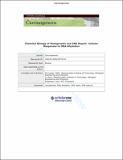Chemical biology of mutagenesis and DNA repair: cellular responses to DNA alkylation
Author(s)
Shrivastav, Nidhi; Li, Deyu; Essigmann, John M.
DownloadNidhi Shrivastav-Revised submission pdf proof.pdf (1.431Mb)
OPEN_ACCESS_POLICY
Open Access Policy
Creative Commons Attribution-Noncommercial-Share Alike
Terms of use
Metadata
Show full item recordAbstract
The reaction of DNA-damaging agents with the genome results in a plethora of lesions, commonly referred to as adducts. Adducts may cause DNA to mutate, they may represent the chemical precursors of lethal events and they can disrupt expression of genes. Determination of which adduct is responsible for each of these biological endpoints is difficult, but this task has been accomplished for some carcinogenic DNA-damaging agents. Here, we describe the respective contributions of specific DNA lesions to the biological effects of low molecular weight alkylating agents.
Date issued
2009-10Department
Massachusetts Institute of Technology. Department of Biological Engineering; Massachusetts Institute of Technology. Department of ChemistryJournal
Carcinogenesis
Publisher
Oxford University Press (OUP)
Citation
Shrivastav, N., D. Li, and J. M. Essigmann. “Chemical Biology of Mutagenesis and DNA Repair: Cellular Responses to DNA Alkylation.” Carcinogenesis 31.1 (2009): 59-70. Web. 15 Feb. 2012.
Version: Author's final manuscript
ISSN
0143-3334
1460-2180